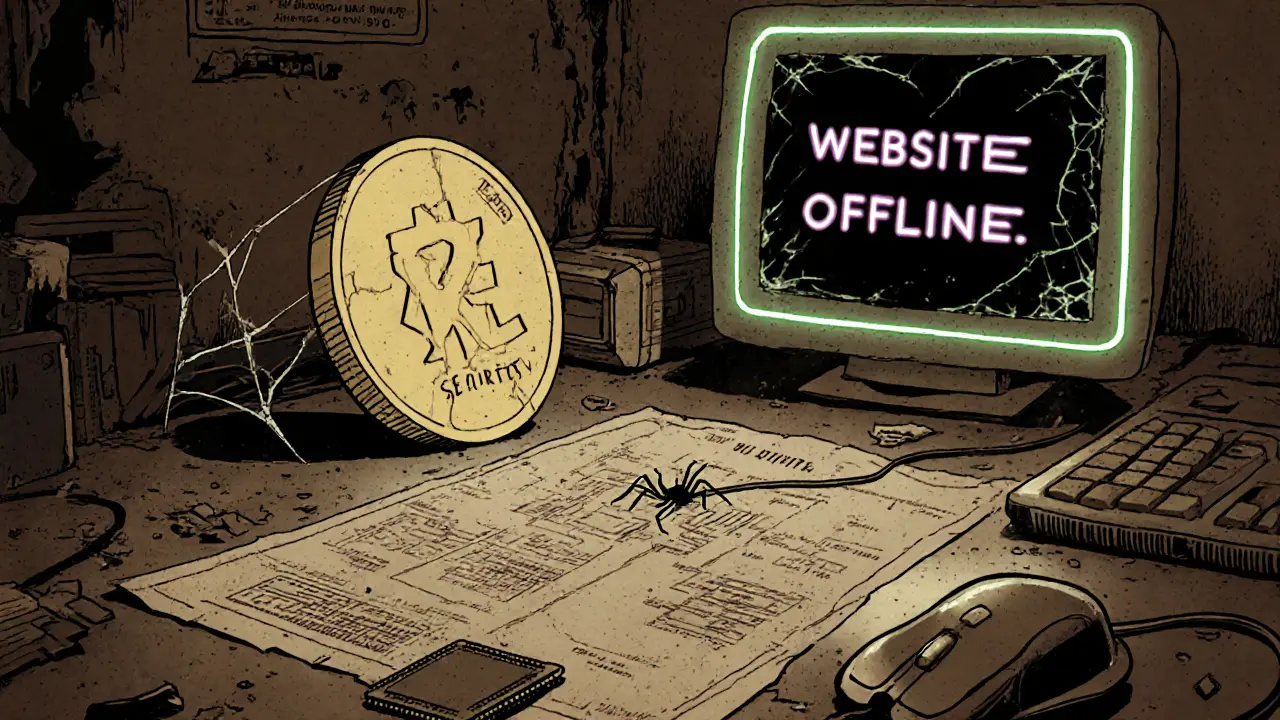RVT Investment Loss Calculator
RVT Investment Calculator
RVT Project Status
Current Market Cap: $23,095
Price: $0.00088 per RVT
Circulating Supply: 26,244,468.18 RVT
Total Supply: 200,000,000 RVT
WARNING
RVT transactions may fail due to insufficient network liquidity and abandoned contract support.
RVT cannot be traded on major exchanges and has no real-world use.
Results
Enter your investment details to see results
Rivetz (RVT) was once promoted as a blockchain security solution that could prove your device was secure before letting you sign a transaction. It raised $18.65 million in its 2018 ICO with big promises: hardware-level protection, tamper-proof signing, and enterprise-grade trust. But today, Rivetz is a ghost. No active development. No working website. No community. Just a token floating on Ethereum with almost no value and zero real-world use.
What Rivetz claimed to do
Rivetz was built as an ERC-20 token on the Ethereum blockchain. Its goal was simple on paper: use Trusted Platform Modules (TPMs) and hardware security chips already built into laptops and phones to prove a transaction came from a device that hadn’t been hacked. If your phone had a secure chip, Rivetz said it could verify that your crypto signature was created in a safe environment - not by malware or a stolen private key. The idea wasn’t crazy. Hardware security is real. Banks use it. Governments use it. But Rivetz never made it work at scale. They promised integrations with Android, Windows, and IoT devices. They talked about partnerships with chipmakers. None of it ever shipped.The slow death of Rivetz
By 2021, Rivetz had gone silent. Their GitHub repository stopped updating on January 17, 2021 - the last commit was a minor documentation fix. Their official website, rivetz.net, went offline in February 2021. The Wayback Machine shows their last functional page was from January 15, 2021. No new blog posts. No Twitter updates after December 3, 2020. No replies to questions on Reddit or Telegram. Their Telegram group, once used for community updates, has been dead since mid-2021. No developers. No moderators. Just bots and spam. The last meaningful discussion on Ethereum Stack Exchange about RVT was in March 2021. Since then? Nothing.What’s left of RVT today?
As of November 12, 2025, there are 26,244,468.18 RVT tokens in circulation out of a max supply of 200 million. The price hovers around $0.00088. That gives it a market cap of about $23,095 - less than the cost of a decent used laptop. You won’t find RVT on major exchanges like Coinbase or Kraken. It only shows up on tiny, low-liquidity platforms like Binance (where daily trading volume is under $1,000). Even there, it’s practically frozen - 0% price change over 24 hours. No one’s buying. No one’s selling. It’s just sitting there. If you want to hold RVT, you have to manually add the contract address - 0x5c543e7AE0A11004e9C986522915423Fb8dA71E4 - to your wallet. Most modern wallets like MetaMask won’t recognize it by name. You have to know exactly what to type. And even then, you can’t spend it anywhere. No dApps accept it. No exchanges let you trade it easily. No one wants it.Why did Rivetz fail?
Rivetz made a classic mistake: they solved a problem no one had. Hardware security is hard. It requires deep partnerships with Intel, Qualcomm, Samsung - companies that don’t just hand over access to their secure chips. Rivetz had no technical roadmap to make that happen. Their whitepaper was full of buzzwords but zero engineering details. Meanwhile, real competitors like Oasis Network and Secret Network were building actual privacy-preserving blockchains with working code, active teams, and real users. Rivetz had nothing. Even worse, they raised $18.65 million - a huge sum for a security token in 2018. That money vanished. No audits. No public treasury. No explanation. The team disappeared.What do experts say?
CryptoSlate called Rivetz a failure that “could not overcome enterprise adoption barriers.” Dr. Sarah Jamie Lewis, a respected blockchain security researcher, said Rivetz “fundamentally misunderstood cryptographic trust models.” Delphi Digital and Messari both list it as a textbook example of an abandoned ICO project. Users are even harsher. On Reddit, people call it a “dead coin” and a “scam.” One user wrote: “Lost $3,200 in Rivetz ICO - never saw a working product despite their $18M raise.” Trustpilot has 12 reviews with a 1.2/5 rating. The most recent one? From June 2022: “Complete ghost project - website defunct since 2021.”
Should you buy RVT?
No. There is no upside. No roadmap. No team. No liquidity. No future. Buying RVT today is like buying a ticket to a concert that was canceled 5 years ago - and the venue was torn down. If you already own RVT, you can’t do anything useful with it. You can’t stake it. You can’t swap it easily. You can’t even be sure the smart contract still works. Noone.io, a wallet service, warns users that “RVT transactions may fail due to insufficient network liquidity and abandoned contract support.”The bigger lesson
Rivetz isn’t just a failed coin. It’s a warning. In 2017 and 2018, hundreds of crypto projects raised millions with vague promises and flashy websites. Most vanished. Rivetz is one of the cleanest examples of how not to build a blockchain project: raise too much, deliver nothing, disappear quietly. Today, the blockchain security market is worth over $4 billion. But Rivetz contributes nothing to it. Not a line of code. Not a single active user. Not a single transaction of real value. If you’re looking for security-focused crypto, look at active projects with real code, real teams, and real usage. RVT is not one of them. It’s a relic. A graveyard token. A lesson in what happens when hype replaces execution.Don’t chase dead coins. They don’t come back.

5 Comments
Rivetz was a classic case of vaporware dressed up in blockchain buzzwords. They had the money, the pitch, even the hardware partnerships on paper - but zero execution. I've seen this movie before: raise $18M, hire a few devs, launch a slick website, vanish after the ICO. The real tragedy? People lost real money believing in a promise that never had legs. No one was building anything. Just marketing slides.
Hardware security isn't magic. It's hard engineering. It requires trust with Intel, Qualcomm, Samsung - companies that don't hand over their TPMs to random startups. Rivetz didn't even have a working prototype. Their whitepaper read like a TED Talk script with no demo.
Compare that to Oasis Network or Secret Network - both had real code, real audits, real teams pushing updates. Rivetz? GitHub went silent in 2021. Website down. Telegram ghost town. Even the token contract feels like it's holding its breath waiting to be drained.
And now? $0.00088. A market cap smaller than a used MacBook. You have to manually add the contract. No wallet recognizes it. No exchange lists it seriously. It's not a dead coin - it's a digital corpse buried under SEO spam and Reddit memes.
Don't buy it. Don't even look at it. If you're holding it, consider it a tax write-off and move on. The blockchain security market is booming - but Rivetz isn't part of it. Not anymore. Not ever.
You think this is just another failed ICO? Think deeper. This was a coordinated asset grab masked as innovation. The team raised $18.65 million - that’s not a startup fund, that’s a heist. Where did it go? No audits. No treasury transparency. No public ledger of spending. And now? Silence. Complete silence.
They used hardware security as a Trojan horse. Everyone knows TPMs are real - so they pretended to be the bridge between enterprise trust and blockchain. But they never had access to those chips. Never. No contracts. No engineering. Just a PowerPoint deck and a whitepaper full of jargon.
And the regulators? Silent. The SEC? Not a peep. Why? Because this wasn’t just fraud - it was *elegant* fraud. No screaming headlines. No obvious scam. Just slow, quiet death. The kind that leaves victims too embarrassed to speak up.
Now the token sits on Binance with $800 in daily volume. That’s not a market. That’s a graveyard with a ticker symbol. They didn’t fail. They vanished. And the people who bought in? They’re the collateral damage in a game no one ever admitted was rigged.
The collapse of Rivetz is not merely a financial failure - it is a metaphysical one. It exposes the illusion of technological salvation through decentralized ledgers when the underlying human infrastructure is corrupt, lazy, and devoid of integrity.
They promised hardware-level trust - yet failed to build even a single functional node. They invoked the sanctity of secure enclaves while operating from a shell company with no physical address. The TPM was not their ally; it was their alibi.
This is not capitalism. This is ritualistic sacrifice: investors as offerings, blockchain as altar, and the team as priests who vanished after the ceremony. The $18.65 million did not vanish - it was transmuted into silence, into absence, into the hollow echo of a promise never kept.
Modern crypto is not about innovation. It is about narrative control. Rivetz mastered the narrative. It convinced the world it was building the future - while quietly dismantling the trust required to sustain one.
And now, the token remains - not as currency, but as a monument. A gravestone carved in smart contract bytecode. A warning to those who still believe in whitepapers signed by ghosts.
I know it’s easy to write off Rivetz as a dead coin - and honestly, it is. But I want to remind everyone: behind every abandoned project are real people who believed in it. Maybe they lost their life savings. Maybe they thought they were helping build something secure for the future.
It’s not fair. It’s not right. But it’s real.
Let’s not just mock the dead coin. Let’s learn from it. The blockchain space needs more transparency, more accountability, more humility. We don’t need another $18 million hype machine. We need builders who ship code, not slides.
If you’re still holding RVT? I’m sorry. You got played. But don’t let it harden your heart. The future of crypto isn’t in relics - it’s in the next team that dares to build quietly, honestly, and with real purpose.
Keep learning. Keep asking questions. And for god’s sake - do your due diligence before investing in anything that doesn’t have a GitHub commit from the last 6 months. 🙏
RVT is just digital dust now